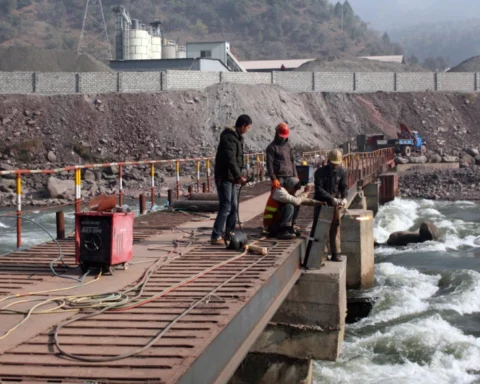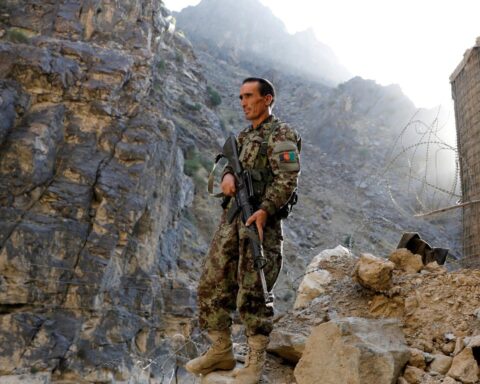ALMATY, Kazakhstan — More than 20 activists and politicians are languishing in prison cells in Kyrgyzstan after a weekend crackdown threatened a fresh cycle of turmoil in Central Asia’s most restless country.
The October 23 raids targeted an array of public figures from former security bosses to rights advocates who had one thing in common — their opposition to a controversial border deal with Uzbekistan.
Any such border agreement would be a landmark for two countries whose leaders could barely stand to be in the same room less than a decade ago. But it would require Kyrgyzstan to cede control over a strategic reservoir called Kempir-Abad.
Opposition to the agreement in the Uzgen district — where the reservoir is located — has been stubborn and persistent, going back more than a year to when it was first mooted.
Critics say Uzbekistan should be able to use the dam’s water but the reservoir’s land should remain a part of Kyrgyzstan.
On October 22, a public committee “in defense of Kempir-Abad” was formed, with a rally in Bishkek then called for October 24.
Committee members didn’t have to wait long for a reaction.
One video filmed at rights defender Rita Karasartova’s home on October 23 showed a man in plainclothes and another in police uniform attempting to force their way through her gate as Karasartova — wearing a bathrobe — demanded to see their identification.
On October 24, Kyrgyz Ombudswoman Atyr Abdrakhmatova said her institute was aware of 21 arrests and expressed concern at the detentions.
The Interior Ministry said it was carrying out an investigation into alleged preparations for an “organized mass riot.”
Civil activist Dinara Oshurahunova told RFE/RL that many of the detained had already been accused in the case and could face between five and 10 years in prison if found guilty.
Along with Karasartova, who was seen being taken to court in handcuffs on the evening of October 24, other high-profile detainees include Azimbek Beknazarov, nicknamed “the Bulldozer” for his role in Kyrgyzstan’s 2005 and 2010 revolutions, former provincial governor Bektur Asanov, and ex-constitutional court judge Klara Sooronkulova.
A Taste Of His Own Medicine?
For populist President Sadyr Japarov and his dominant ally, national security committee head Kamchibek Tashiev, the Kempir-Abad reservoir is a sore topic.
That is not least because it is the kind of issue they would have jumped on during their days in opposition, which ended when the pair rose to power during a political crisis two years ago.

Land, water, and mineral resources are all trump cards for political populists in Kyrgyzstan. After honing this art as government opponents, the duo now faces stiff domestic challenges.
But critics say they could have saved themselves the fierce backlash if they hadn’t been so clumsy.
Nursultan Akylbek, a Bishkek-based activist who hails from Uzgen, told RFE/RL the government failed to consult with the local population prior to striking a deal with Uzbekistan last year that would have seen the reservoir on Kyrgyz territory pass to Uzbek control.
After the first wave of unrest over the agreement, Tashiev addressed locals in a stadium and assured them Kempir-Abad would not be given to Uzbekistan, Akylbek recalled.
“Now we see troll factories attacking critics of the deal, arrests, and political persecution instead of political dialogue. We know that this doesn’t lead to anything good,” Akylbek noted.
On October 24, dozens of activists marched to protest against the border agreement and the arrests. The marchers were not detained.
Similar-sized rallies in support of the government were held in Uzgen and Jalal-Abad.

In his first comments on the arrests, Japarov said he could not interfere with the judicial process but could consider presidential pardons in the event of convictions.
Activists and politicians were using Kempir-Abad as “an excuse to cling to power,” he said in an interview with the state media outlet Kabar, claiming some of the detained had asked him for government positions.
Revolving Doors
For much of its three decades of independence, Kyrgyzstan has resembled a Greek tragedy, with periodic crackdowns on opponents, civil society, and the media exacerbating the unrest that the panicked leaders were trying to quell. That led the fiercely independent Kyrgyz people to rise up and oust the offending regimes on at least two occasions.
Japarov himself spent three years in jail, until the post-vote chaos of October 2020 that saw him suddenly released into the political fray and fast-tracked into the presidency.
Sooronbai Jeenbekov, who left the presidency to make way for him as Japarov’s supporters massed in Bishkek, was the third Kyrgyz president to leave office during a political crisis.
Japarov has always insisted his incarceration on hostage-taking charges was a fabrication and that the sentence was punishment for his opposition to the foreign company that operated Kyrgyzstan’s largest gold mine, Kumtor.
But it didn’t take long for the new government to imitate this practice, with former prime ministers among those arrested during Japarov’s first full year in power.
For those bold actions, among other populist measures, Japarov and Tashiev still retain strong popular support.

Polling conducted by the International Republican Institute in April 2022 showed 85 percent of the population backing the direction the country was moving in.
By August and September of this year that figure had fallen to 76 percent.
The Kempir-Abad issue appears to have woken up a marginalized political opposition.
Adahan Madumarov, a popular lawmaker who hails from a village close to the reservoir, was a member of the public committee set up to oppose the agreement in its current form.
The eloquent politician known for his pro-Russia views was not targeted in the raids.
But a member of his Butun Kyrgyzstan party’s political council was questioned by police in connection with the movement to save Kempir-Abad on October 24, RFE/RL’s Kyrgyz Service reported.
Lawmaker Chingiz Aidarbekov, a former foreign minister, was last week removed from his position as chair of the parliament’s International Affairs Committee after refusing to sign off on a committee motion backing the agreement.
Some of the politicians arrested over the weekend were thought to have long ago faded from relevance.
Writing on Twitter, one news site editor asked why Japarov had chosen to “breathe life into political corpses.”
But it is not just Kempir-Abad where Japarov is having problems.
More than a year after authorities seized control over the Kumtor mine — a move that he had called for while in opposition and which has undoubtedly boosted his standing — the president and his team are facing criticism over a perceived lack of transparency in the mine’s operations.
The potential exploitation of a giant iron deposit as a means of paring down debts to China represents another hot potato for the government.
In August, 19-year-old blogger Yrys Zhekshenaliev was charged with inciting mass disorder after posting a video clip of a politician railing against plans to develop the deposit, called Zhetim-Too.
Speaking to reporters at a court hearing, Zhekshenaliev couldn’t help but comment on the irony: “I’m sitting in the same cell Japarov sat in.”





